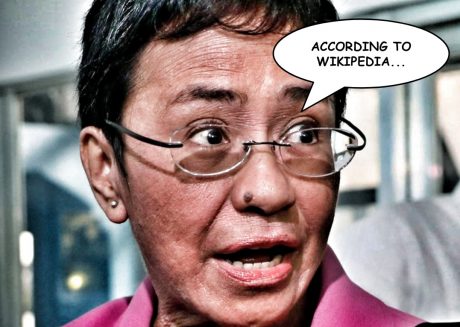
What possessed Rappler CEO Maria Ressa to post a link to an FHM Philippines article
that then links to a Wikipedia article that exhibits a “List of
Philippine Fake News Sites”? Everyone knows that Wikipedia is not a
reliable source of “news”. Yet here is the self-appointed “thought
leader” on all things digital, a crusader against “fake news” and the
so-called “assault on press freedom” she imagines is being perpetrated
by the Philippine government, building an entire blanket accusation
against an entire community of publishers on the back of a Wikipedia
“list”.
Ironic, right?
Challenged by her critics (which she all arbitrary labels “Duterte
trolls”), Ressa digs herself deeper into the rabbit hole she wandered
into and cited the “sources” referenced by the authors of the Wikpedia
article — the National Union of Journalists of the Philippines (NUJP)
and the Center for Media Freedom & Responsibility (CMFR). This
proves further that Ressa, as she hinted in a response to her
detractors, was not merely retweeting the FHM article, she actually stands by its message as well.
Full disclosure first. One of the sites included in the Wikipedia
“List of Philippine Fake News Sites” is our very own satellite blog GRPundit which was the subject of a complaint we lodged a while back
requesting that it be removed on grounds that it does not fit already
widely-recognised definitions of what “fake news” is. The complaint also
articulates the utter intellectual dishonesty in regarding the NUJP and
CMFR as the final authorities on what is and what isn’t “fake news”.
It is interesting to note that Ressa — supposedly God’s Gift to
Philippine journalism — did not do the right thing and take a statement
from the stakeholders behind GetRealPhilippines.com first before unilaterally “reporting” that the Wikipedia “fake news” list and its propagators, corporate media sites like FHM, make valid
assertions. Ressa knows where to find us. But she chooses not to get in
touch with us for comment. That’s not very “journalistic” of her now,
is it?
Stepping back even further, there really is no final authority per se
on what is and what isn’t “fake news” to begin with. Attempts to
institutionalise processes to judge the fakeness or authenticity of
“news” are inherently problematic. Recently, a proposed “anti-fake news
law” reportedly being proposed in the Malaysian parliament has come under heavy criticism as an attempt to “stifle free speech”.
The proposed Anti-Fake News Bill 2018 will give the [Malaysian] government sweeping powers to hit those it deems guilty of creating or spreading fake news with jail terms of up to six years and fines that could as high as $130,000.
It is expected to be easily passed next week as Najib’s ruling coalition has a majority in the country’s 222-seat parliament and is but the latest example of how the phrase championed by US President Donald Trump has been adopted and used by leaders across Asia.
We can see here that institutionalising processes to determine
authenticity — or fakeness of information — is an inherently intractable
proposition even for a national government. That Ressa would suggest
that the NUJP and CMFR are similar such authorities is ludicrous and,
quite frankly, intellectually dishonest. Indeed, as I argued in what turned out to be a futile complain lodged with Wikipedia “editors”…
The NUJP or National Union of Journalists of the Philippines is a *trade union* of journalists and, as such, does not necessarily represent the industry — only its employees and professional practitioners. There are other professional bodies in the Philippines such as the National Press Club (NPC). The NUJP is also known to be a left-leaning organization and, therefore, is not necessarily representative of the broader community of journalists [in the Philippines]. An important point to make too is whether or not they have jurisdiction over judging the nature of a blog site such as GRPundit. Even if they were, as you postulate, a “reputable” organization of professional journalists, they would wield authority over the practice of journalism but not necessarily over blogging. For that matter, as I pointed out earlier, the emerging definition of “fake news” (the term already being problematic as it is) does not cover blogs in general but is specific about publishers who/that *pretend to be news sites*.
Maria Ressa should stop being so fixated on a crusade against this
mythical spectre of “fake news” she and her ilk in liberal “journalism”
cooked up and, instead, focus on doing her job and doing it properly. The only way to beat “fake news” is to improve the quality of “mainstream news” reporting and earn back the trust
of today’s readers. Skirting accountability for losing this trust by
distracting people with fictitious narratives about “fake news” will not
help Ressa’s cause. Only trust will, and by the way things are going, public trust is not something Ressa enjoys by the bucketloads nowadays.

No comments:
Post a Comment